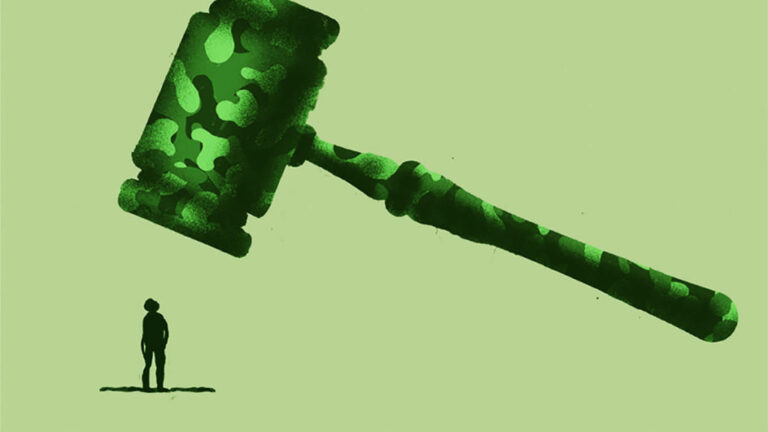
The government’s decision to hold military court trials of the perpetrators of the May 9 violent riots following the arrest of former prime minister Imran Khan in a corruption case has been roundly condemned by human rights organisations as well as the legal fraternity.
Pakistan Tehreek-e-Insaf (PTI) supporters stormed the streets across the country last month, damaging public and private properties, including the residence of a top military commander in Lahore and the gate of the army’s General Headquarters in Rawalpindi.
Thousands have been arrested, including top PTI leaders, and the government has repeatedly said it will take strict action against those involved in the riots. The decision to try those involved under the Army Act was announced on May 20.
In a statement, Amnesty International said trying civilians in military courts is contrary to international law.
“This is purely an intimidation tactic, designed to crack down on dissent by exercising fear of an institution that has never been held to account for its overreach,” Amnesty said. “… The right to a fair trial, guaranteed by Pakistan’s constitution, is severely undermined by this move and cannot be justified.”
The Human Rights Commission of Pakistan has also opposed the use of these laws to try civilians.
“While those responsible for arson and damaging public and private property during the recent protests should be held to account, they remain entitled to due process,” the group said.
The Pakistan Bar Council (PBC) has called on the relevant authorities to exercise extraordinary care and restraint in the military court trials of civilians.
Condemning the attacks on private and public property, the Council insisted that protests should remain peaceful and no one should be allowed to take the law into their own hands.
Furthermore, the PBC reiterated its consistent view that civilians are not ordinarily tried under the Army Act 1952 but, in lieu of the circumstances surrounding the May 9 riots, urged the authorities to practice restraint and ensure that no innocent shall be persecuted.
PBC Executive Committee’s Chairman Hassan Raza Pasha told a media outlet that the PBC’s stance is clear that civilians should not be tried in military courts.
“Civilians should only be tried in ordinary courts or the anti-terrorism courts (ATCs). If [the accused] is army personnel, then by all means they should be tried in military courts,” he said. “But civilians should not [be tried in military courts], and the PBC’s stance is clear on this.”
Regarding differing opinions on requiring a constitutional amendment to try civilians under the Army Act 1952, Pasha stated that there is no such need.
“Although it is the persistent view of the PBC that [military court trials of civilians] should not happen in the first place, section 2(i)(d) of the Army Act 1952 permits the trial of civilians.”
On the right to appeal military court verdicts, he explained that the military courts have their own hierarchy and that the final authority to hear appeals lies with the Chief of Army Staff.
“However, if there are any procedural deficiencies, or constitutional or legal violations – like, for example, the charge sheet was not given or a defence lawyer was not provided – then the accused can file a petition in the high courts under Article 199.”
WHAT IS THE ARMY ACT AND WHO DOES IT PROSECUTE?
The Pakistan Army Act, which was brought into force in 1952, is used to put military personnel on trial under the military’s own legal code. In some provisions and cases, this law is also applicable to civilians.
The act was meant to prosecute army personnel and civilians attached with the military in some capacity.
In 1966, under the rule of military leader Ayub Khan, an amendment was made to the act whereby civilians accused of inciting mutiny within the rank and file through written and verbal material, could be tried under the act.
Civilians accused of sharing official state secrets with the enemy may also be tried in a military court as well as those civilians who are accused of targeting and attacking military installations.
HOW ARE TRIALS CARRIED OUT?
The court that hears cases brought under the act is called the Field General Court Martial. This military court functions under the supervision of the military’s legal directorate, also called the Judge Advocate General (JAG) branch.
The president of this court is a serving military officer, and the prosecution counsel is also a military officer.
Those tried in the court are given the right to have lawyers, and in case they cannot afford one, they can appoint military officers to represent them.
If convicted, defendants have the right to file an appeal within 40 days to an army court of appeal.
If, after going before the army court of appeal, defendants believe they have not received a fair trial or express dissatisfaction with the proceedings, they can subsequently go to higher courts.
WHAT ARE THE PUNISHMENTS?
Depending on the severity of the offence, the punishments can vary from two years to a life sentence, and even capital punishment.
WHO HAVE BEEN TRIED UNDER THE ARMY ACT?
Pakistan has had a history of cases being sent to military courts.
Under the tenure of Imran Khan as PM between August 2018 and April 2022, more than 20 civilians were tried under the law.
One of the convictions was that of human rights activist Idris Khattak, who was sentenced to 14 years in 2021 on charges of espionage. Khattak was convicted of providing sensitive information to a “foreign intelligence agency”.
In 2020, the Peshawar High Court rejected the convictions of nearly 200 people and ordered their release if they were not found guilty of any other crime. The individuals were allegedly members of banned groups and were accused of attacking civilians and the military.
The convicts were sentenced to either capital punishment or various prison terms.